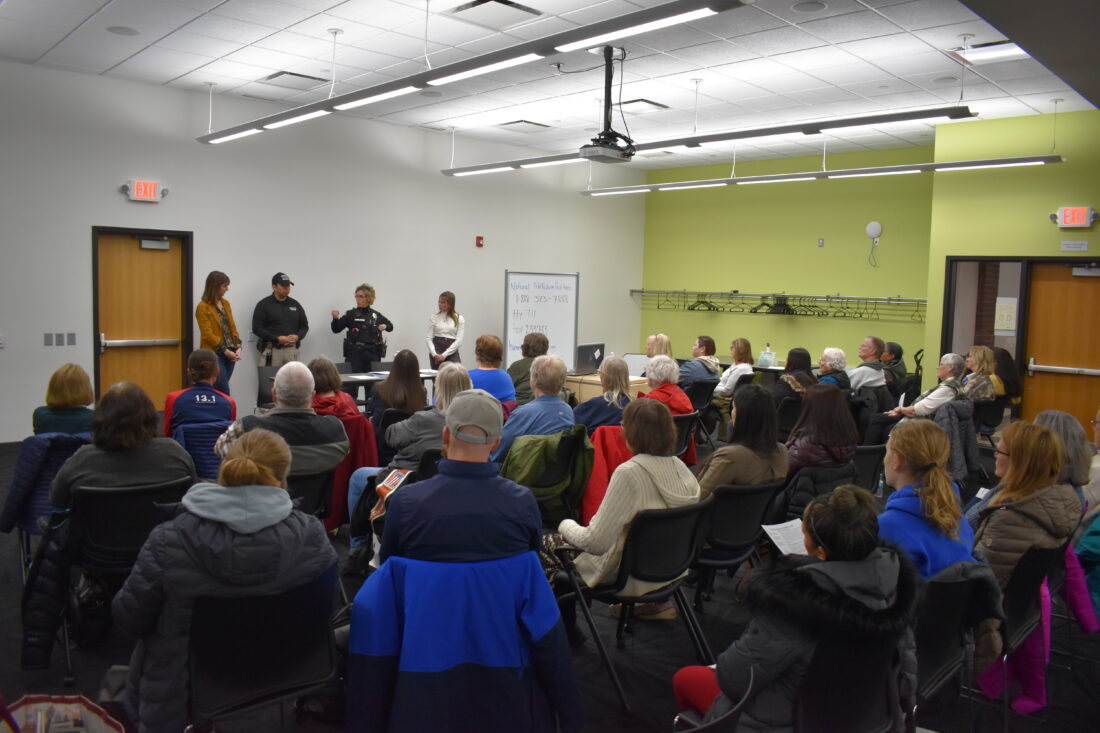LAST Watch hosts human trafficking identification and prevention seminar

Community members from around the area packed into the Marshalltown Public Library Tuesday evening for an informational seminar providing guidance for identifying the signs of human trafficking and sharing the steps citizens can take to help stop the criminal enterprise.
Orchestrated by LAST Watch, a Marshalltown nonprofit which seeks to educate on issues related to human trafficking, the seminar featured guest speakers from the Marshalltown Police Department, Wings of Refuge, an Ames organization that provides recovery opportunities for survivors of sex trafficking, and ACCESS, the Assault Care Center Extending Shelter and Support in Marshalltown.
A primary focus during Tuesday's event was educating the public on identifying potential warning signs that human trafficking is taking place.
Brandy Young, Executive Director of Wings of Refuge, shared with the gathered crowd advice she has heard when it comes to identifying cases of human trafficking.
“I've heard it said that it's the absence of normal,” Young said. “That's very vague, but it can help you pay attention. So, if you're looking at a situation and something just doesn't seem normal… you have to pay attention and lean in, don't investigate but make the phone call.”
This absence of normal can take shape in many different ways. Among many other circumstances, possible human trafficking victims may lack personal possessions, appear coached on what to say, may shoplift to meet their basic needs, have someone else in possession of necessary documents, work long hours with income not coinciding with the time worked, or show signs of being deprived of basic needs.
Though, as MPD Lt. Tricia Thein pointed out during the discussion, “Each of these things in and of themselves are not indicative of guarantee for human trafficking, but it's certainly gonna be a first red flag, and we want to pay attention to each of these things individually…. Not every single one means human trafficking is happening, but it certainly means that your spidey senses should be going off. You should be raising an eyebrow saying this seems odd.”
She added that agrarian states like Iowa are more susceptible to labor trafficking, a lesser known but equally prevalent form of human trafficking.
“You have an environment set up for agriculture, or factories that support the agriculture business, farming, seasonal work. You may get some migrant workers,” Thein said. “Not all of those workers understand workers rights in America, and they easily can be exploited and victimized, because they have transitional housing, they lost contact with family, maybe they don't have access to their documents… There's a lot of barriers that actually help isolate that worker potentially [and] leave them open and vulnerable for exploitation.”
Above all, the speakers conveyed that being aware and vigilant of your surroundings, and the people within them, along with knowing the signs of human trafficking, is the best way to recognize potentially dangerous situations.
If someone does suspect they may be a witness to human trafficking, the guest speakers at the event unanimously heavily cautioned against becoming involved personally. Rather, they suggested becoming a “great” witness and to give timely, accurate information about the traffickers to local law enforcement.
The National Human Trafficking Hotline, reached at 1(888) 373-7888, takes human trafficking tips and phone calls 24/7 year round. More information can be seen on their website: humantraffickinghotline.org.
To become involved in stopping human trafficking more locally, or to find more information about warning signs of human trafficking, see LAST Watch's Facebook page at www.facebook.com/profile.php?id=100064892285885 or the Iowa Network Against Human Trafficking and Slavery's website at www.iowanaht.org.
——
Contact Nick Baur at 641-753-6611 or [email protected].
This “Eyes on Trafficking” story is reprinted from its original online location.
Fair Use Notice: The PBJ Learning Knowledge Vault is dedicated to advancing understanding of various social justice issues, including human trafficking and related topics. Some of the material presented on this website may contain copyrighted material, the use of which has not always been specifically authorized by the copyright owner. We are making such material available in our efforts to promote education and awareness of these important issues. There is no other central database we are aware of, so we put this together for both historical and research purposes. Articles are categorized and tagged for ease of use. We believe that this constitutes a ‘fair use' of any such copyrighted material as provided for in section 107 of the US Copyright Law. In accordance with Title 17 U.S.C. Section 107, the material on this site is distributed without profit to those who have expressed a prior interest in receiving the included information for research and educational purposes. For more information on fair use, please visit: “17 U.S. Code § 107 – Limitations on exclusive rights” on Cornell Law School's Legal Information Institute.
 ABOUT PBJ LEARNING
ABOUT PBJ LEARNING
PBJ Learning is a leading provider of online human trafficking training, focusing on awareness and prevention education. Their interactive Human Trafficking Essentials online course is used worldwide to educate professionals and individuals how to recognize human trafficking and how to respond to potential victims. Learn on any web browser (even your mobile phone) at any time.
More stories like this can be found in your PBJ Learning Knowledge Vault.
EYES ON TRAFFICKING
This “Eyes on Trafficking” story is reprinted from its original online location.
ABOUT PBJ LEARNING
PBJ Learning is a leading provider of online human trafficking training, focusing on awareness and prevention education. Their interactive Human Trafficking Essentials online course is used worldwide to educate professionals and individuals how to recognize human trafficking and how to respond to potential victims. Learn on any web browser (even your mobile phone) at any time.
More stories like this can be found in your PBJ Learning Knowledge Vault.
